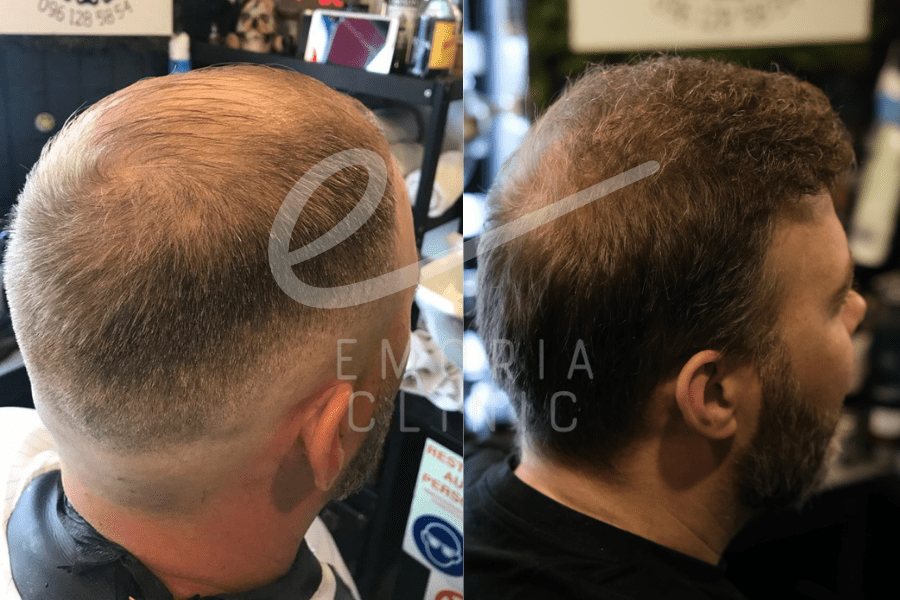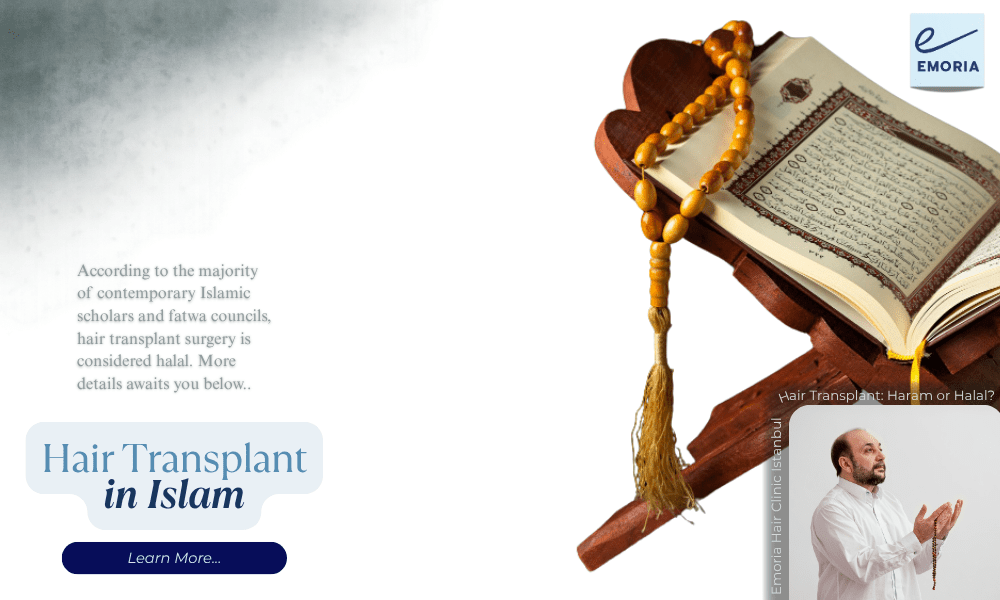Hair loss can be a painful and even embarrassing situation for most people that have bad psychological and emotional effects.
With the advancement in technology and surgical expertise, hair transplantation offers a permanent solution to this problem. Hair transplant is a minimally invasive surgery in which hairs are taken from one part of the body, called the donor area, to the bald area, called the recipient area.
But hair transplant in Islam is a topic of debate among Muslims, as it is considered halal (permissible) by some scholars and haram (non-permissible) by others. It creates questions in the minds of common Muslims to know exactly whether it is permissible or not.
This guide will help you understand hair transplants in Islam in the light of Islamic teachings and scholarly points of view and answer your questions.
Islamic Teachings on Changing Physical Appearance
- The teaching of Islam emphasizes gratitude for Allah’s creation and discourages any type of change in it.
- Islam also discourages excessive beautification for the sake of vanity or deceiving others.
- Every act performed or avoided is mainly done with the intention or niyyah behind it.
Hadiths That Discuss Hair Extensions and Alterations
Al-Bukhari (5937) and Muslim (2122) narrated from Ibn Umar (may Allah be pleased with him) that the Messenger of Allah (blessings and peace of Allah be upon him) said: “ May Allah curse the one who adds hair extensions and the one who has them added, the one who does tattoos and the one who has them done.”
According to this hadith of the Prophet (SAW), the use of wigs, hair extensions, and tattoos are clearly not permissible (haram) in Islam, no matter whose hair is used—the person’s own, another person’s, or any animal’s.
Islamic Interpretation of Hair Transplant Hadiths
Scholars differ on whether these hadiths directly apply to hair transplantation.
Some argue the prohibition is specific to artificial attachments, while others see a broader principle against altering one’s natural state for cosmetic reasons.
Islam Encourages Medical Treatment for Illness
The Quran, hadiths, and the teachings of Islam permit and even encourage seeking medical attention for diseases.
There are a number of hadiths in Sahih Bukhari, Book 71, from number 582 to 673, of the Prophet (SAW) regarding diseases and treatment and seeking medical attention.

Is Hair Transplantation Halal According to Islam?
Hair transplant is a modern technology and a permanent solution for hair restoration and treatment of baldness. There are no Quranic ayats or hadiths directly explaining its permissibility or non-permissibility.
There are differences of opinion regarding hair transplants in Islam. Some Muslim scholars considered it halal (permissible) as it deals with the treatment of disease and is not specifically done for beautification, and some scholars have the contradictory opinion and considered it haram (non-permissible).
Hadiths on hair restoration
The Quran and the hadiths do not specifically address hair restoration and hair transplantation, as hair transplantation is a modern surgical technique for the treatment of hair loss.
Fatwa’s of Islamic scholars about hair restoration
The International Islamic Fiqh Academy had issued a fatwa on hair transplantation that hair transplant is permissible (halal) if done to treat the condition called baldness. The intention should be to treat the hair loss condition to save the person from other psychological and emotional conditions.
Dar al-Ifta Misriyyah (Egypt Fatwa Academy) issued the fatwa that hair transplant is permissible in Islam if the intent is to restore the natural appearance and not alter the natural appearance to deceive.
Which Hair Transplant technique is halal in Islam?
There are two primary techniques of hair transplant
- Follicular hair extraction (FUE)
- Follicular hair transplantation (FUT)
Other considerations are
- Direct hair implantation (DHI)
- Robotic hair transplant
- Flap transplantation
- Micrografts
- And more..
All these techniques use the method of taking hairs along with hair from the donor area and putting it in the bald area. Some of these techniques take just hairs along with follicles, and some take hairs with a skin stripe. All these methods of hair transplant are considered halal according to Islamic perspective.
Halal Hair Loss Treatment Alternatives
There are multiple treatment options available to treat hair loss or hair thinning. Other than hair transplants, all treatment options are called temporary treatments, as they are required for long periods of time and multiple times, and after treatment is over, hair starts shedding or thinning again after a certain duration.
These are:
- Medical treatment of using medications like finasteride
- The use of minoxidil spray
- Platelet rich plasma (PRP) insertion into the head
- Stem Cell Therapy and more..
Conclusion: Is Hair Transplant Permissible in Islam?
The teachings of Islam have a clear stance on simplicity and gratitude for Allah’s creation and discourage altering creation for the purpose of beautification or deceiving others.
Yet, Islam also allows and encourages seeking medical attention in case of diseases for treatment and restoration of the natural state of body and mind. Most scholars declared hair transplant and hair restoration halal.
References
International Islamic Fiqh Academy (Majma’ al-Fiqh al-Islami), OIC.
Resolution No. 173 (11/18), Jeddah, 2006.
Permanent Committee for Islamic Research and Ifta (Saudi Arabia).
Fatwa No. 2188 by Shaykh Ibn Baz, Shaykh Uthaymeen, and others.
Dar al-Ifta al-Misriyyah (The Egyptian Fatwa Council).
Fatwa No. 3265, 2007.
There is a difference of opinion. Many scholars consider it halal if the purpose is to treat hair loss or baldness, not for vanity or deception.
Techniques like FUE, FUT, and DHI are generally considered halal as they use a person’s own hair and do not involve wigs or artificial additions.
Institutions like the International Islamic Fiqh Academy and Dar al-Ifta Misriyyah have issued fatwas declaring hair transplants permissible for medical or restorative purposes.
Yes, as long as the intention is to restore natural appearance and not for deceitful beautification, it is considered permissible.
No, but it’s advised to avoid washing the transplanted area for at least 2–3 days post-operation. After that, ghusl and ablution are allowed.
Yes, but avoid positions that exert pressure on the scalp (like sujood) for at least 48 hours after the procedure.
Yes, since it is a non-nutritive, medical procedure done under local anesthesia, it doesn’t invalidate the fast.

